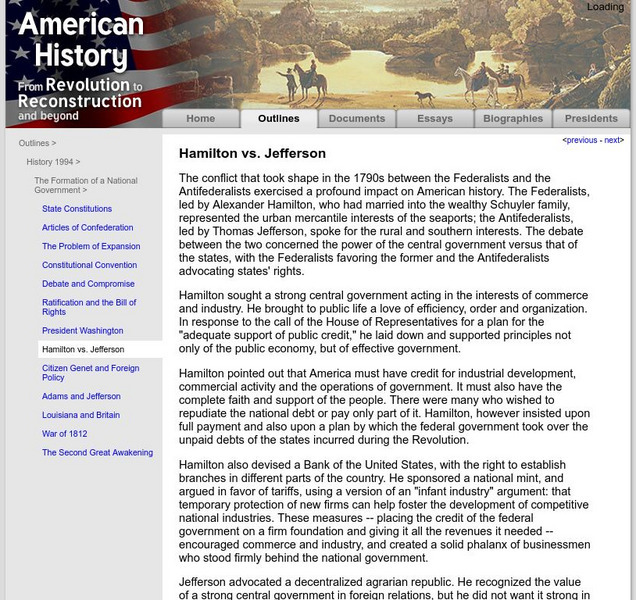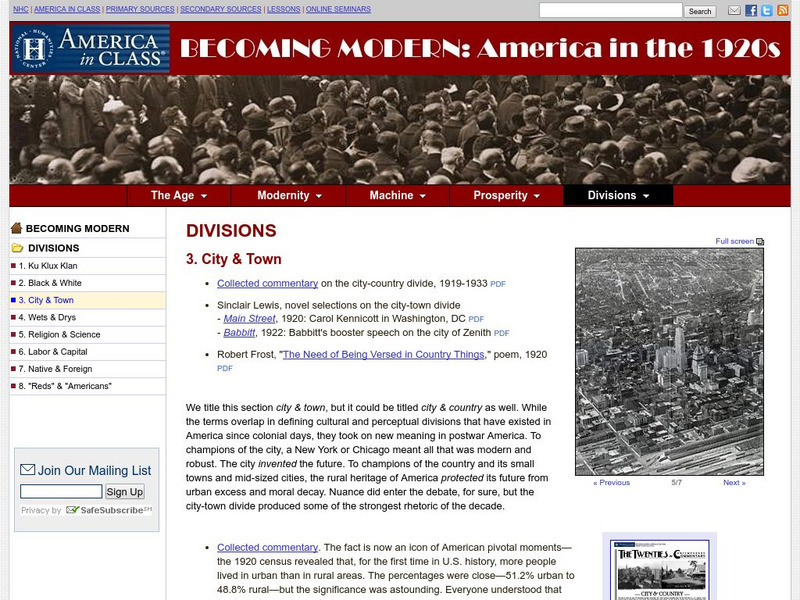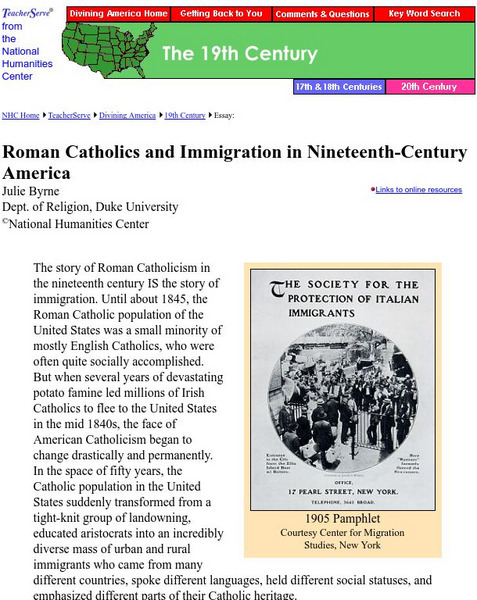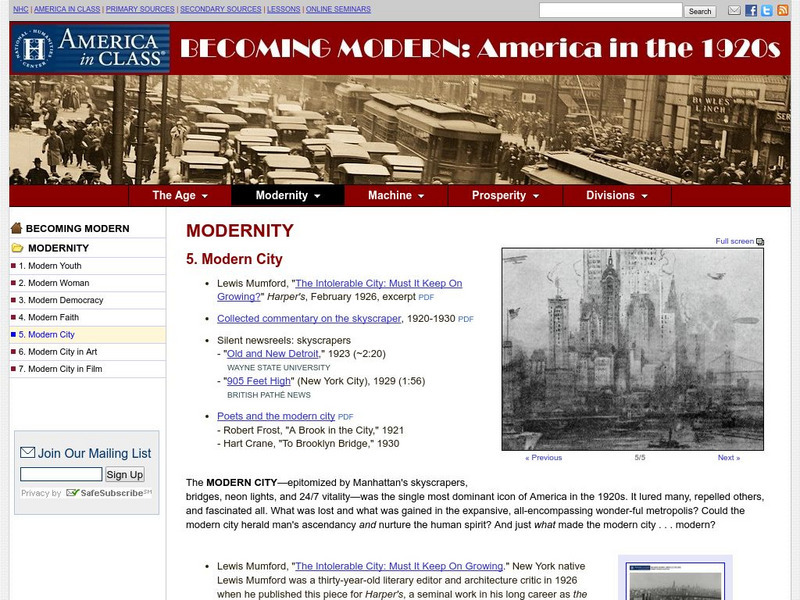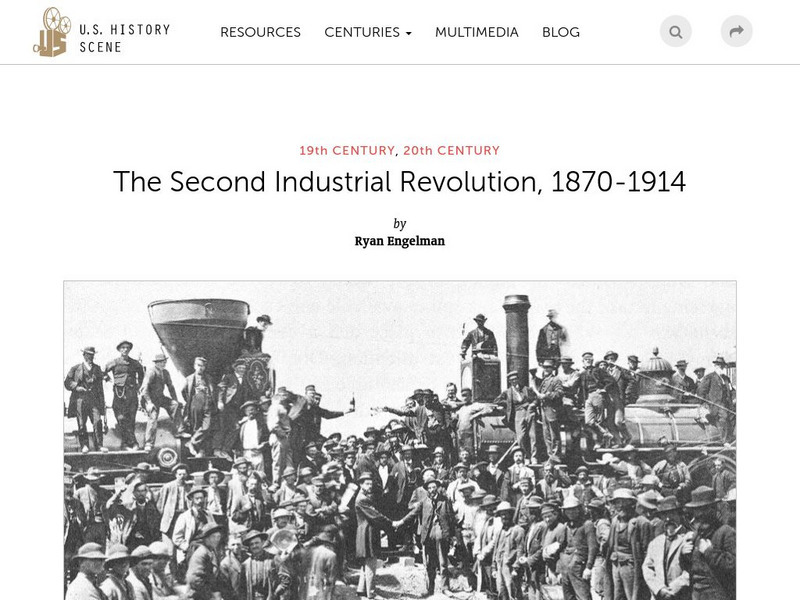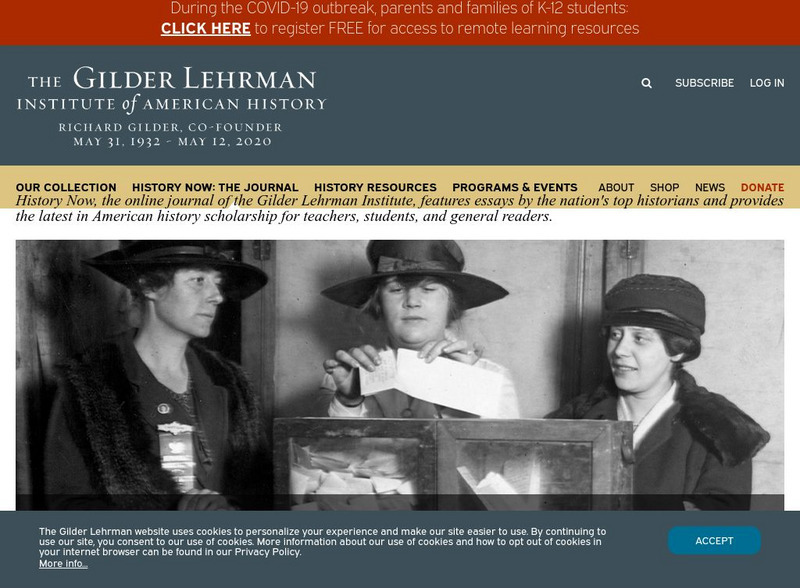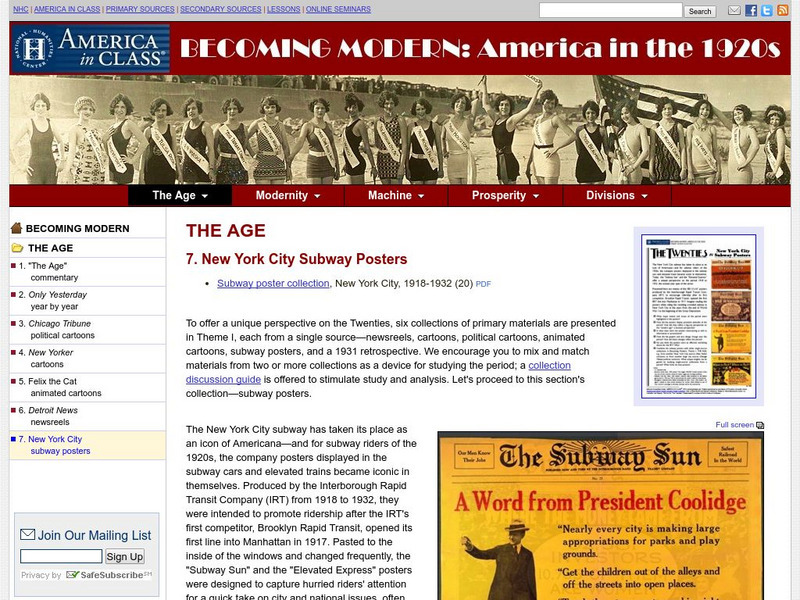PBS
Pbs: "Kill the Indian and Save the Man": Native American Representation
Learn about the impact of US government policies of assimilation, relocation, and urbanization on Native American identity and culture in this series of videos from the American Masters film Words from a Bear: N. Scott Momaday. Years...
US Department of State
America.gov: Megalopolis
An excellent definition of a megalopolis. Begins with the creation of Megalopolis and delves into the dominant theme which is "Urban-ness." The "Changing Patterns in Megalopolis," are also discussed.
University of Groningen
American History: Outlines: The Era of Expansion and Reform
This resource, a speech by Woodrow Wilson to Congress on April 8, 1913, gives a great review of how the United States transformed from from a rural country to an urban one. It includes a review of industrialization, new inventions,...
Other
U.s. History Timeline: 1865 1900
A thumbnail look at the many things occurring in the United States in the last half half of the 19th century. The topics covered are Gilded Age Politics, the "New Imperialism," Industrial America, Growth of Labor, Urbanization,...
US Senate
U.s. Senate Committee on Banking: Home
Learn more about the Committee on Banking, Housing, and Urban Affairs at this website. "The Committee has a broad jurisdiction over the operation of our nation's financial institutions, housing and mass transit programs." This site is...
University of Groningen
American History: Outlines: Hamilton vs. Jefferson
The conflict that took shape in the 1790s between the Federalists and the Antifederalists exercised a profound impact on American history. The Federalists, led by Alexander Hamilton, who had married into the wealthy Schuyler family,...
American-Israeli Cooperative Enterprise
Jewish Virtual Library: Israeli Population Statistics Table
A table sorting population demographics by religion, age, and urban centers.
US Department of State
America.gov: Foundations of Human Activity
An excellent overview of the immigration activity and subsequent settlement patterns of the United States. Discusses major reasons for population shifts and growth of population centers.
National Humanities Center
National Humanities Center: America in Class: America in the 1920s: City & Town
The National Humanities Center presents collections of primary resources compatible with the Common Core State Standards - historical documents, literary texts, and works of art - thematically organized with notes and discussion...
National Humanities Center
National Humanities Center: Teacher Serve: 19th Century: Roman Catholics & Immigration in 19th Century America
Essay answers the question, "Why did so many Catholics come to the United States at this time?" The potato famine, urban industrialization, chance for a new life, are among some of the answers.
Library of Congress
Loc: Progressive Era to New Era, 1900 1929
This website defines and explores the Progressive Era and various aspects of American society during that period of history. It contains fairly simple text and several images.
National Humanities Center
National Humanities Center: America in Class: America in the 1920s: Modern City
The National Humanities Center presents collections of primary resources compatible with the Common Core State Standards - historical documents, literary texts, and works of art - thematically organized with notes and discussion...
US National Archives
Nara: Charters of Freedom: The Constitution: Amendments 11 27
Check here to read the three amendments passed during the Progressive Era, the 16th, 17th, & 18th amendments. From the National Archives and Records Administration.
Calisphere: University of California Libraries
University of California: Calisphere: 1900 1940s: Growing Ethnic Diversity
Primary source images highlighting the diverse immigrants who came to California in the early 20th century and some of the challenges they faced.
Other
Nccp: Who Are America's Poor Children? [Pdf]
Learn the basic facts regarding children in American who are living at poverty levels or below. The numbers of children in poverty appear to be increasing to almost 13 million. The sheet identifies which ethnic groups have the most...
University of Groningen
American History: Outlines: The Era of Expansion and Reform
Information about the period in United States history between the Civil War and World War I. The United States was transformed from a rural republic to an urban state.
Other
The Centennial Museum and Chihuahuan Desert Gardens
The Centennial Museum is an academic support and outreach unit of the University of Texas at El Paso focusing on the natural history and the indigenous, colonial, pre-urban, and folk cultures of the border regions of the southwestern...
Other
U.s. History Scene: The Second Industrial Revolution, 1870 1914
Between 1820 and 1860, the visual map of the United States was transformed by unprecedented urbanization and rapid territorial expansion, facilitated by the railroad system. These changes mutually fueled the Second Industrial Revolution...
Varsity Tutors
Varsity Tutors: Web English Teacher: Langston Hughes
This resource focuses on the works of famous African-American author, Langston Hughes.
Gilder Lehrman Institute of American History
Gilder Lehrman Institute: History Now: Immigration in the Gilded Age:using Photographs as Primary Sources
[Free Registration/Login Required] This resource presents a lesson plan about immigration that uses photographs as primary sources.
Curated OER
Map: Imperialism and the Balance of Power
World maps of the Colonial Empires of 1914 as well as their revenues during that time period. There are also maps depicting urban growth, type of government, wars and atrocities, and living conditions of the world in 1900.
Curated OER
Map: Imperialism and the Balance of Power
World maps of the Colonial Empires of 1914 as well as their revenues during that time period. There are also maps depicting urban growth, type of government, wars and atrocities, and living conditions of the world in 1900.
Country Studies US
Country Studies: Lyndon Johnson and the Great Society
Lyndon B. Johnson ascended to the presidency after the assassination of President Kennedy in 1963. With a year to go until the election of 1964, LBJ appropriated Kennedy's "New Frontier" and transformed this agenda into his "Great Society."
National Humanities Center
National Humanities Center: America in Class: America in the 1920s: New York City Subway Posters
The National Humanities Center presents collections of primary resources compatible with the Common Core State Standards - historical documents, literary texts, and works of art - thematically organized with notes and discussion...





